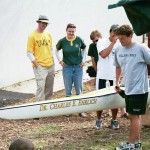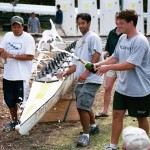It is hard to overstate the impact Coach Ehrlich, and all WMRC program directors, have had on the lives of their rowers. Not surprisingly our recent graduates often memorialize their former coaches by naming boats in their honor. In 2011, a young alumnus secured the naming rights to the Nathan Walker. In 2007, young alumni christened the Robert Montague. But this tradition has older roots. In 2001, a group of young WMRC alumni purchased a new 8+ shell for the team. At MACCCs, they christened this boat the Dr. Charles Ehrlich. For the next decade it would serve as the top boat for the varsity men’s team and it is still rowed to this day.
Below is Dr. Ehrlich’s powerful response from May 2001. This piece summarizes what FWR is all about. As the team prepares for the championship regattas, please consider continuing this legacy by honoring someone special.
“I have long said just how highly I value the students at William & Mary, and what a rewarding experience it was to coach them for three years from 1996-99. Even after I am gone and most of the ones I knew have graduated, they continue to impress me.
Earlier this month, I received a call from a former student who graduated last year. I had just emerged from a meeting which had run ninety minutes over schedule and I was rushing off to the lake where I was already late for practice. In the course of the overly-quick telephone call, he informed me that a bunch of recent graduates had pooled together and bought a new men’s heavyweight eight for the team, and that it would be dedicated at the Mid-Atlantic Championships three days later in my name.
I was honored and flattered that they would do such a thing. But I had no time to let it sink in. The more I thought about it, the more I was honored and the more they impressed me.
Think about it. Here are kids who graduated from college between 1998-2000. They are either in their first jobs after college or they are in graduate school. They are not the sort of people who have a lot of disposable income, nor are they the sort of people who normally go around buying $20,000 boats. They had graduated from what is possibly the financially poorest per capita collegiate program in the US, a program which never had enough equipment and in which they had to get used to making sacrifices. We bought and sold on the second-hand market to keep our fleet up, and our equipment was famously in variable states of repair and disrepair. As students, they had to pay dues in order to row, and they had to find creative ways to raise the team’s entire operating budget. There is every reason to expect that, once graduated, they would have a right to wait around a few years before giving more than a token contribution.
But they did not wait. They knew that, even though they have graduated, the team needed them. As far as I am aware, the team has only ever received five brand-new boats in its history (4+s in 1992 and 1995, two matching light-to-midweight women’s eights in 1994 one of which was subsequently sold onwards in 1999, and a women’s heavyweight eight in 1999). Everything else has been second-hand, including all the eights ever used primarily by its men’s crews. There is nothing quite so exciting as receiving a brand-new boat, and the program needed and deserved one.
As recent graduates from such a program, they could be forgiven for moving on; for saying that they made do when they were there, and therefore the next generation should make do; for thinking that they had suffered through enough and paid enough, so they were entitled to a break from buying things for William & Mary Rowing. Yet they did not.
That they put my name on the boat was a big surprise. They kept it secret from me. So well, in fact, that although I am the Secretary of the Friends organization and am supposed to be privy to all the records, their donations came quietly (and certain records seem not to have reached me). The first word I heard was a phone call three days before the dedication. Sadly, three days is not enough notice to pop over from Switzerland, so I missed the ceremony. I understand that it went successfully, and that one of the umpires that day was a fellow I rowed against in high school and then rowed with in college, and he even said a few words (after being assured that the boat was being named in my honor and not my memory).
But it must be stressed what made this remarkable. Rich programs with long traditions (such as my alma mater) are used to receiving boat donations. Poor programs are not. Indeed, the alumni have extra reason not to give: the program was so poor that they spent their time on the team paying their dues to keep it afloat, and having done their share now they deserve a respite. But this reason for normal people not to give is the very same reason for remarkable people to give: because the team is poor and they had to carry the burden for four years, they want to make the burden lighter for future generations, to allow current and future William & Mary rowers to have opportunities they themselves never had.
Let us count our blessings. One of mine was coaching at William & Mary and having the opportunity to coach these students.”



